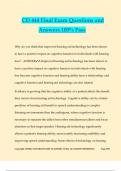Exam (elaborations)
CD 444 Final Exam Questions and Answers 100% Pass
CD 444 Final Exam Questions and
Answers 100% Pass
Why do you think that improved hearing aid technology has been shown
to have a positive impact on cognitive function in individuals with hearing
loss? - ANSWER-Improved hearing aid technology has been shown to
have a positive impact on cognitiv...
[Show more]
Preview 4 out of 55 pages
Uploaded on
November 26, 2024
Number of pages
55
Written in
2024/2025
Type
Exam (elaborations)
Contains
Questions & answers
Institution
CD 444
Course
CD 444
$12.49
Also available in package deal from $64.99
100% satisfaction guarantee
Immediately available after payment
Both online and in PDF
No strings attached
Also available in package deal (1)
$ 160.37
$ 64.99
13 items
1. Exam (elaborations) - Cd 444 test 2 practice questions and answers 100% pass
2. Exam (elaborations) - Cd 444 exam 2 study guide solutions updated 2024
3. Exam (elaborations) - Final exam for cds 444 questions and answers 100% pass
4. Exam (elaborations) - Cds 444 exam #1 study guide solutions
5. Exam (elaborations) - Cds 444 exam 3 questions and answers 100% pass
6. Exam (elaborations) - Cd 444 exam 3 study guide solutions
7. Exam (elaborations) - Cd 444 final exam questions and answers 100% pass
8. Exam (elaborations) - Cd 444 exam study guide solutions
9. Exam (elaborations) - Cd 444 exam 2 practice questions and answers 100% pass
10. Exam (elaborations) - Cd 444 exam 5 practice questions and answers 100% pass
11. Exam (elaborations) - Cd 444 exam 1 practice questions and answers 100% pass
12. Exam (elaborations) - Cd 444 exam 1 study guide solutions
13. Exam (elaborations) - Cd 444 exam 2 study guide solutions updated 2024
Show more
CD 444 Final Exam Questions and




